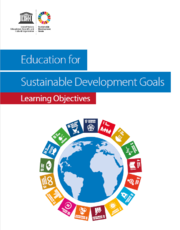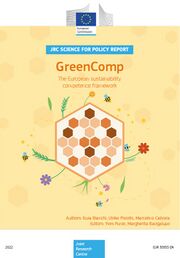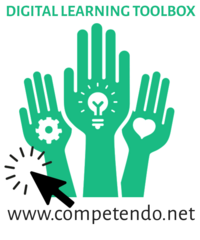Contents
Education for Sustainable Development (ESD)
Empowers learners with knowledge, skills, values and attitudes to take informed decisions and make responsible actions for environmental integrity, economic viability and a just society. UNESCO.
A detailed description of Education for Sustainable Development's learning objectives can be found in the brochure: ESD Learning Objectives
The subject of Education for Sustainable Development (ESD) is defined by the term "sustainability", coined by the United Nations Commision "Our Common Future". Although environmental issues are central to this approach to education, this definition shows that they are not the sole core. Sustainability here is related to the environment, the social, the economic. In addition, "development" refers to the fact that ESD is a transformative approach to education - towards a more sustainable world.
This also shows how strongly ESD is linked to active citizenship education, the commitment to a democratic and sustainable society.
Video: What is Education for Sustainable Development?
GreenComp - EU Competence Framework
The European sustainability competence framework, created in 2022 by the European Commission/Joint Research Centre.
GreenComp identifies a set of sustainability competences to feed into education programmes to help learners develop knowledge, skills and attitudes that promote ways to think, plan and act with empathy, responsibility, and care for our planet and for public health.
Materials: Education for Sustainable Development/ Global Learning
GreenComp
The European sustainability competence framework
DownloadHow to Engage Citizens with the Sustainable Development Goals
Inspiration, tools and cases by Finnish Development NGOs Fingo
PDFSustainability and Bildung
Created in European Association for the Education of Adult's Bildung project
PDFHandbook: Sustainable Entrepreneurship
Non-formal education methods collected in the project Growing Green by Fora Copenhagen.
DownloadGlobal Citizenship Education
Wintersteiner, Grobbauer, Diendorfer, Reitmair-Juárez
Citizenship Education for Globalizing Societies
DownloadSix Steps to Global Citizenship
A Guide for Youth Workers, Youth Leaders and Trainers
DownloadGlobal Youth Work
Allen, Dwyer
Activities for Global Citizenship
DownloadThe Everyday Beyond
European, international and global dimensions of learning processes.
DownloadSherpa Tools
Polish-German Youth office's online tools for Education for Sustainable Development in German and Polish
WebEnvironment and Civil Involvement
How Can We Connect Education for Sustainable Development and Active Citizenship Empowerment? DownloadTeaching & Learning for a Sustainable Future
UNESCO Toolbox WebYouth Xchange towards sustainable lifestyles
UNEP and UNESCO Toolbox WebGlobal Education Guidelines
Concepts and methodologies on global education for educators and policy makers of the Council of Europe DownloadGlobal Citizenship Education
Topics and Learning Objective by UNESCO
DownloadEducation for Sustainable Development Learning Goals
UNESCO's learning goals on ESDPDFPISA Global Competence Framework
OECD's Global Competence Model PDFT-KIT 13 - Sustainability and youth work
E. Keen, J. Pinkeviciute, A. Hayes, A. Berecz, B. Akyüz for CoE/EUC Download



















